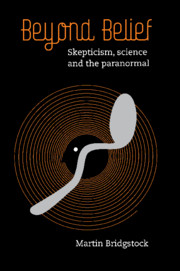Book contents
- Frontmatter
- Contents
- Preface
- Introduction: The paranormal and why it matters
- Chapter 1 The nature of science
- Chapter 2 The paranormal
- Chapter 3 Skepticism – from Socrates to Hume
- Chapter 4 Modern skepticism
- Chapter 5 Bringing skepticism down to earth
- Chapter 6 Skepticism, ethics and survival
- Chapter 7 Skepticism beyond the paranormal
- Bibliography
- Index
Chapter 2 - The paranormal
Published online by Cambridge University Press: 05 April 2010
- Frontmatter
- Contents
- Preface
- Introduction: The paranormal and why it matters
- Chapter 1 The nature of science
- Chapter 2 The paranormal
- Chapter 3 Skepticism – from Socrates to Hume
- Chapter 4 Modern skepticism
- Chapter 5 Bringing skepticism down to earth
- Chapter 6 Skepticism, ethics and survival
- Chapter 7 Skepticism beyond the paranormal
- Bibliography
- Index
Summary
What exactly is the paranormal? The term comes from the Greek prefix para meaning ‘beyond’. Hence, the paranormal is beyond normal. It has been equated with ‘weird things’, pseudoscience, the supernatural and a great deal more. But what exactly is it?
Carl Sagan takes one approach when he lists the items which can, in his view, be investigated as part of the paranormal. He lists several dozen phenomena, starting with ‘astrology, the Bermuda Triangle, “Big Foot” and the Loch Ness Monster’ (Sagan 1997, p. 208) and ending with ‘innumerable cases of acute credulity by newspapers, magazines and television specials and news programs’ (Sagan 1997, p. 209).
Sagan's list is very inclusive, and he also manages to make it quite funny. A problem may occur to the reader, though: why those beliefs in particular? And, if we only use a list like Sagan's, what if other possible forms of paranormality appear? How do we decide what should go on the list? Sagan gives us no guide, no way of deciding what is and what is not paranormal.
Clearly, what we need is some sort of definition. Here is a skeptic's definition of the paranormal. David Marks defines it as follows: ‘as related to psychic research, faculties and phenomena that are beyond “normality” in terms of cause and effect as currently understood’ (Marks 2000, p. 28).
And here is a believer's definition. JB Rhine is the founder of modern parapsychology.
- Type
- Chapter
- Information
- Beyond BeliefSkepticism, Science and the Paranormal, pp. 38 - 63Publisher: Cambridge University PressPrint publication year: 2009



